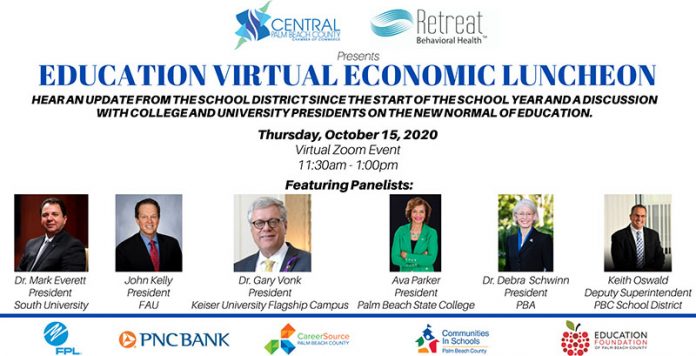The Central Palm Beach County Chamber of Commerce held a virtual economic luncheon on the theme of education on Thursday, Oct. 15 via the Zoom platform. The event focused on how local schools and colleges have adapted to life with COVID-19.
Panelists included South University President Dr. Mark Everett, Florida Atlantic University President John Kelly, Keiser University Associate Vice President Dr. Gary Vonk, Palm Beach State College President Ava Parker, Palm Beach Atlantic University President Dr. Debra Schwinn and Palm Beach County School District Deputy Superintendent Keith Oswald.
Everett said that South University’s programs, which are about 70 percent medical related, adapted quickly to the pandemic.
“The challenges that were put before us were tackled head on, and I’m very pleased to report that we have done quite well in our response,” he said. “Most important was the implementation of technologies that we haven’t used in the past. This quarter is the first that we have actually invited students back to the campus. We were well prepared. We have exceeded all requirements by the CDC. All in all, I think the response has been tremendous. It has been an amazing experience, it has been a challenging experience, but we’re safer now.”
Kelly said adaptation to the pandemic has been a challenge for FAU’s six campuses. “The state does limit out-of-state enrollment for the in-state universities, and out-of-state students have had a difficult time deciding if they’re going to go home or if they’re going to stay here and stay in a dorm or work remotely,” he said.
FAU has had to move quickly to a remote delivery system, but that is not available for some students.
“That has been challenging, particularly for underserved students who may not have the resources,” he said. “We have about 3,000 students that are still on campus in the dormitories, and all those students we have to provide food for. Normally, we would have 30,000 students visiting our campuses during the week.”
Kelly added that students and faculty are challenged by the mental health side of the pandemic.
“Everybody’s worried about the future,” he said. “Everybody’s concerned about their own livelihood, financially and otherwise, continuing their courses and graduating on time.”
Vonk said Keiser students have returned to campus, although the university has downsized its classes.
“Surprisingly, we have normalized safe behavior,” he said. “We’ve done enough barriers and masked, and cut down the size of the classrooms, and really normalized that mask-wearing behavior. We even have a student group that acts as our safety patrol.”
Parker said that Palm Beach State College, as a non-resident-student institution, has adapted well to the COVID-19 environment.
“Many of our students continue in remote learning, whether it’s traditional online or the new synchronous learning, which has become so popular now, where the student goes to class like they normally would except the professor is online,” Parker said, adding that many students, especially those needing hands-on training, are returning to campus.
Schwinn said that Palm Beach Atlantic students have a program to integrate faith and academics.
“We have a signature program called ‘Workship’ where students do community service,” she said. “We did open in August, and we are in our ninth week of full 100 percent students on campus in class and learning as normal.”
She said students are monitored daily for symptoms of any illness, and the rate of COVID-19 has remained low. Any student showing symptoms of any illness is placed in isolation.
Oswald said the Palm Beach County School District enacted a number of safety policies for all the district schools that apply to students, staff and visitors.
“This policy has allowed us to rearrange our furniture so that we can socially distance on campuses,” he said. “Fortunately, with the number of parents who have chosen to have their students come back to brick and mortar, we have been able to keep that 6-feet social distancing.”








